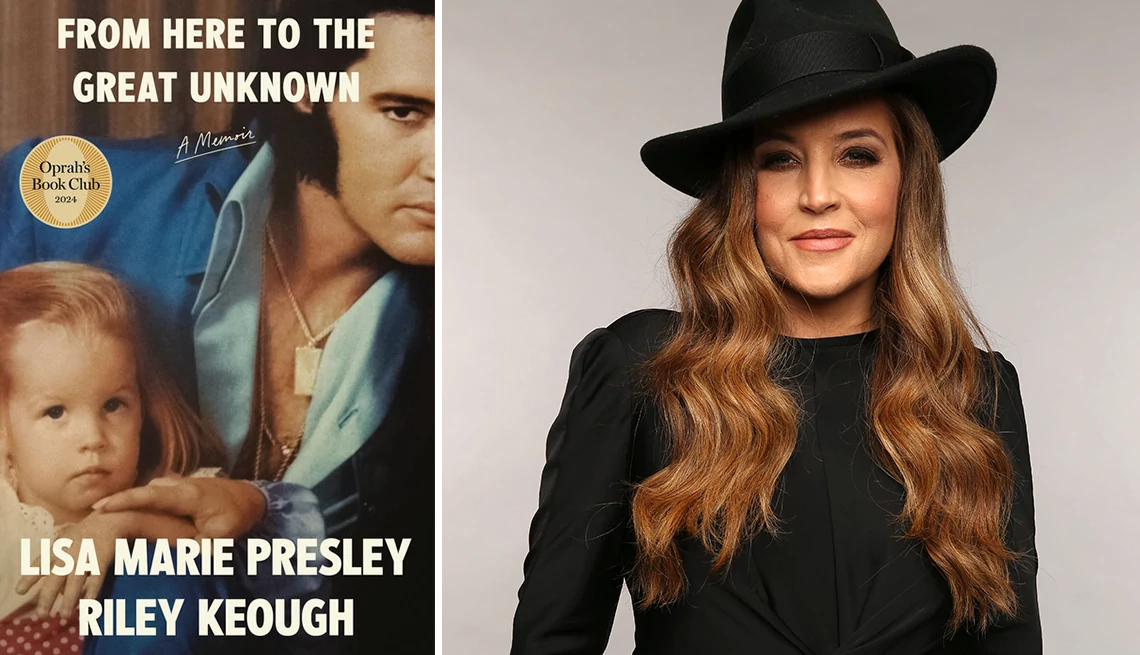
13 surprising things we learned from lisa marie presley’s memoir | members only
- Select a language for the TTS:
- UK English Female
- UK English Male
- US English Female
- US English Male
- Australian Female
- Australian Male
- Language selected: (auto detect) - EN
Play all audios:

Fans of Lisa Marie Presley know she was a lost little girl after the death of her father, Elvis, in 1977 when she was 9, and that her sadness rippled through a largely splintered life. That
included a highly fraught relationship with her mother, Priscilla; four failed marriages (including improbable ones to Michael Jackson and Nicolas Cage, 60); a disappointing singing career;
addiction to drugs and alcohol; the 2020 suicide by gunshot of her son, Ben Keough, and last year, her own death at 54 from a heart attack and small bowel obstruction. But her brutally frank
new memoir, _From Here to the Great Unknown_ (completed and cowritten by her daughter, actress-singer Riley Keough, 35) takes us deeper into her troubled soul. Lisa, who had little identity
apart from Elvis, endured almost unimaginable grief and emotional suffering — more than the public ever knew — and spent her chaotic and truncated life searching for the happiness, peace
and security she had known only with her father. Profoundly broken, she felt unlovable. She had started her book, titled after the lyrics of an Elvis song, “Where No One Stands Alone,” by
recording her memories on a series of tapes, but was unable to complete the work. (“She didn’t find herself interesting,” Riley writes.) A month before she died, she asked her daughter to
help her. Riley fashions the narrative in her mother’s voice, while amplifying Lisa’s memories with her own. Here are some surprising things we learned about the Presleys in _From Here to
the Great Unknown_: Rock ’n’ roll singer Elvis Presley at Graceland circa 1957. Michael Ochs Archives/Getty Images 1. GRACELAND WAS EVEN WEIRDER THAN WE THOUGHT Lisa was a self-described
wild child who saw her father as a god, a chosen human being who could change the weather. After Priscilla divorced him when Lisa was 4, Elvis indulged her every wish when she visited
Graceland. She describes the house as a strange vortex with few rules and strange hours, populated by odd relatives, including Elvis’ Aunt Delta, a diabetic alcoholic who once half-heartedly
threatened Lisa’s cousin Patsy with a knife (“I’ll cut your guts out”). Elvis’ grave in Memphis. Robert Alexander/Getty Images 2. AFTER ELVIS’ DEATH AT AGE 42 SHE FELT PROFOUND GRIEF AND
HAD A HORRIBLE REALIZATION Lisa found Elvis on the floor strung out on barbiturates “so many times,” and even at 9, “I knew that something tragic was coming, which made me feel protective,
that I had to watch out for him.” She sat on the steps and watched her father’s mourners parade through the house for his viewing. But the first time she really felt the loss was when he was
buried in Graceland’s backyard. That meant something equally awful. She was alone with her mother: “More than anything, I felt I was stuck with this woman. It was a one-two punch: He’s dead
and now I’m stuck with her.” Lisa Marie and her mother, Priscilla, in Hollywood attending a Scientology event in 2005. Kevin Winter/Getty Images for CoS 3. HER RELATIONSHIP WITH SCIENTOLOGY
CHANGED THROUGH THE YEARS Priscilla, whom Lisa describes as “chilly” and “never a friend, someone I could talk to,” sent her to boarding schools in an effort to control her wildness, and
finally “dumped” her at the Scientology Celebrity Centre. Though Lisa initially rebelled, going on a four-day cocaine bender, she came to consider Scientology her “tribe” and finally her
“replacement family.” But the book doesn’t address her difficult split from Scientology in 2014. Mike Edwards and Priscilla Presley. Ron Galella/Ron Galella Collection via Getty Images 4.
PRISCILLA’S BOYFRIEND PHYSICALLY AND SEXUALLY ABUSED HER In one of the book’s most shocking sections, Lisa alleges that Priscilla’s boyfriend Michael Edwards routinely fondled her over a
period of years starting when she was 10. When Lisa finally told her mother, who confronted him, “He said, ‘I’m so sorry, but in Europe that’s how they teach the kids, so that’s what I was
doing.’ ”
